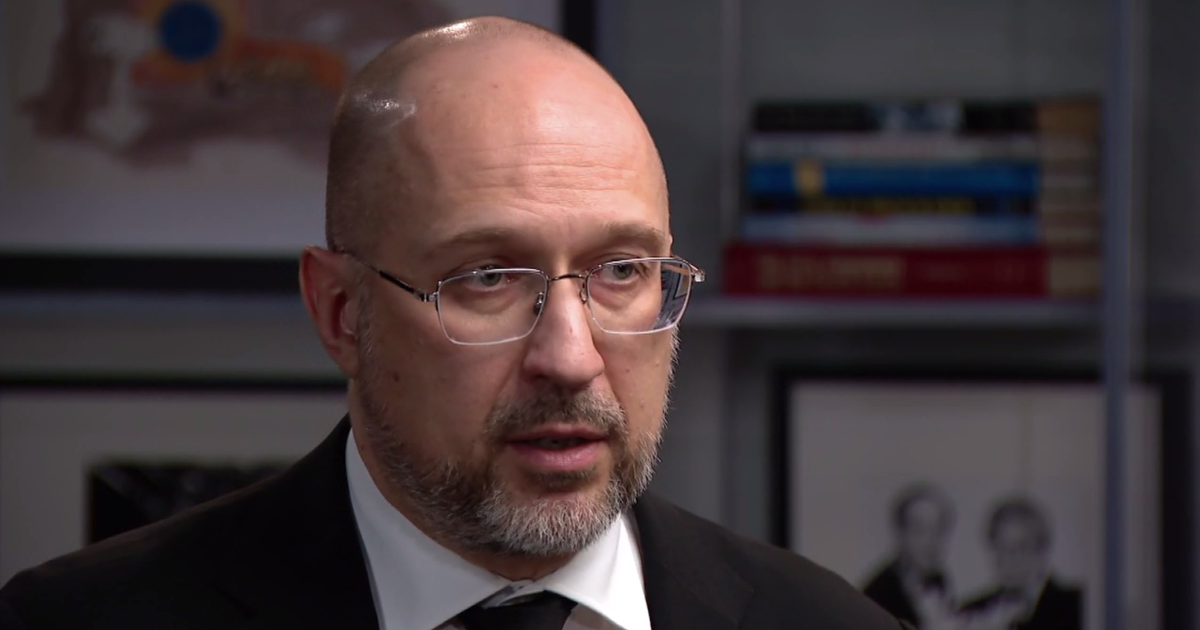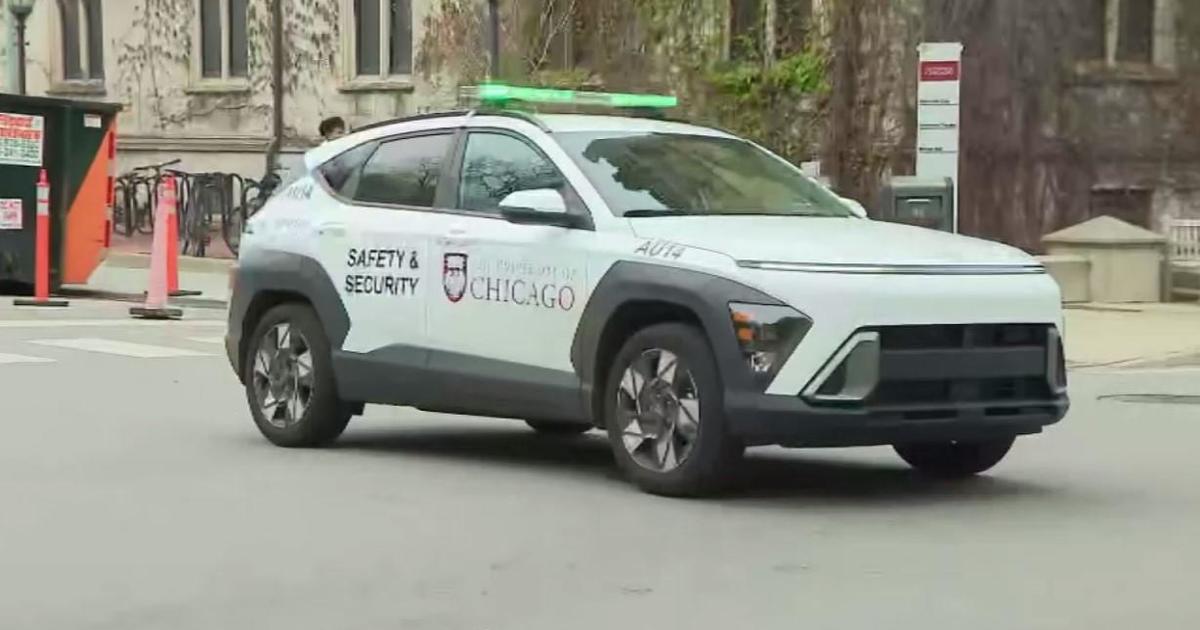On International Space Station, War In Ukraine Has Put 'Crescendo' On Already-Rising Tensions Between U.S. And Russia, University Of Chicago Expert Says
By Adam Harrington, CBS Chicago web producer. Contributing: William Harwood / CBS News, Frank Jordans / Associated Press
CHICAGO (CBS Chicago/CBS News/AP) -- Cooperation between the U.S. and Russia in space was celebrated as the way forward following the collapse of the Soviet Union and the end of the Cold War.
But tensions between astronauts and cosmonauts on the International Space Station have been growing for years now – and a University of Chicago expert said Russia's invasion of Ukraine and the response from the West has put a "crescendo" on those tensions.
U of C space historian and expert Jordan Bimm explained Monday that the International Space Station should not be thought of as a utopian real-life equivalent of the Starship Enterprise. Its launch in 1998 and occupation two years later was an artifact of the optimism at the end of the Cold War and of prioritizing international cooperation rather than a space race.
While cooperation in space and the ISS were thought of as "the model of the future" in the wake of the end of the Cold War, Bimm said the ISS has now become "this artifact of the one place where America and Russia still cooperate."
Bimm traced the history of relations between the U.S. and Russia in space – from tension to cooperation, and now back to tension again. On Oct. 4, 1957, the Soviet Union launched Sputnik as the earth's first artificial orbiting satellite – leading to panic that the U.S. had fallen behind in technology, not only in space, but also in nuclear arms.
"People at the time saw that that meant if (the USSR) can put a satellite in orbit, they can send a nuclear bomb," Bimm said.
On the American side, the Sputnik scare spurred the creation of NASA in 1958, as well as a huge investment in science, technology, and engineering.
Going back as far as the Kennedy administration – there was talk of cooperating with the Soviets in space instead of fighting or competing against them, Bimm said. But it took until after the U.S. declared victory in the space race in putting a man on the moon with Apollo 11 in 1969 for anything like that to happen.
In 1975, the U.S. and USSR launched their first crewed joint space mission – in which an American Apollo module and a Soviet Soyuz module were launched into space and docked together for five joint experiments between American astronauts and Soviet cosmonauts.
"This was sort of seen as a symbol of détente; of the lessening of tensions back on earth," Bimm explained.
The Apollo-Soyuz Test Project was a one-off event at the time, but a pivot toward cooperation became clear in particular after the fall of the Soviet Union. In 1994, an 11-mission program began in which Russian cosmonauts flew in U.S. Space Shuttles, and an American flew in a Russian Soyuz spacecraft, for missions at the Russian space station Mir.
This in turn paved the way for the International Space Station to be occupied by American astronauts and Russian cosmonauts working together.
But Bimm pointed out that such cooperation is an "archaic artifact" of the past now – and tensions between astronauts and cosmonauts have been growing for years as it is.
In 2011, when NASA retired its fleet of space shuttles, astronauts were left with no way to send humans to the ISS except to buy seats on the Russian Soyuz rocket and capsule system. In recent years, the SpaceX commercial crew program provided an alternative to being dependent on the Soyuz system – which Russia was not pleased with, Bimm said.
There has also been tension on the Space Station in that NASA is focused on keeping its mission there limited to scientific research, while the Russian space program has looked to the ISS for money-making opportunities. The first wave of space tourists – including American engineer and astronaut Dennis Tito – paid Russia for the privilege, and just this past year, a Russian film crew went to the ISS with an actor and a director to shoot a movie.
And in 2018, a minuscule drill hole was discovered in part of the ISS – and it became a subject of a blame game between astronauts and cosmonauts, Bimm said. It reached the point where the Russian space agency Roscosmos blamed an American astronaut, Serena Auñón-Chancellor, for drilling the hole despite no evidence of her having done so.
Four years later, Bimm said, tensions are poised to be inflamed even further with Russia having launched an invasion of Ukraine and the U.S. and its allies issuing sanctions.
"Space is not like a utopian separate realm," Bimm said, emphasizing that earthly politics can be an issue in space just as much as on the ground on earth.
This past Thursday, President Joe Biden announced that economic sanctions against Russia in response to the Ukraine invasion would "degrade their aerospace industry, including their space program."
A White House fact sheet providing details about the sanctions did not specifically mention space, but said the United States will impose "Russia-wide restrictions on sensitive U.S. technologies produced in foreign countries using U.S.-origin software, technology, or equipment."
"This includes Russia-wide restrictions on semiconductors, telecommunication, encryption security, lasers, sensors, navigation, avionics and maritime technologies. These severe and sustained controls will cut off Russia's access to cutting edge technology."
NASA said in a statement late Thursday that the agency is continuing to work "with all our international partners, including the State Space Corporation Roscosmos, for the ongoing safe operations of the International Space Station."
"The new export control measures will continue to allow U.S.-Russia civil space cooperation," the statement said. "No changes are planned to the agency's support for ongoing in orbit and ground station operations."
Earlier, Roscomos Director Dmitry Rogozin fired off a string of tweets directing sarcasm and anger at Biden and the West.
He pointed out that Russian thrusters provide the power to boost the station's altitude to counteract atmospheric drag and to move the lab out of the way when threatened by space debris.
"Do you want to ban all countries from launching their spacecraft on the most reliable Russian rockets in the world? This is how you already do it by limiting exchanges between our cosmonaut and astronaut training centers," a translation of his tweet said. "Or do you want to manage the ISS yourself?"
Rogozin even got in a dig against SpaceX founder Elon Musk for launching thousands of Starlink internet satellites that he said have "polluted" low-Earth orbit.
"Maybe President Biden is off topic, so explain to him that the correction of the station's orbit, its avoidance of dangerous rendezvous with space garbage, with which your talented businessmen have polluted the near-Earth orbit, is produced exclusively by the engines of the Russian Progress MS cargo ships," a translation of his tweet said.
He made no mention of a recent Russian anti-satellite weapons test that created a cloud of potentially dangerous space debris.
In any case, Russian engines also will provide the thrust needed to safely drive the space station back into the atmosphere at the end of its life, targeting re-entry over an unpopulated stretch of ocean to ensure no debris falls on populated areas.
"If you block cooperation with us, who will save the ISS from an uncontrolled deorbit and fall into the United States or Europe?" he tweeted in Russian, according to Google Translate. "There is also the option of dropping a 500-ton structure to India and China. Do you want to threaten them with such a prospect?
"The ISS does not fly over Russia, so all the risks are yours. Are you ready for them? Gentlemen, when planning sanctions, check those who generate them for illness Alzheimer's just in case. To prevent your sanctions from falling on your head. And not only in a figurative sense."
The current crew on the ISS is composed of four Americans, two Russians, and one German representing the European Space Agency. The commander of the mission is a former Russian Air Force pilot.
Bimm emphasized that the crews on the ISS are selected to be consummate professionals and are trained on inter-crew dynamics – but human beings are still human beings, and tension on earth is not absent in space.
"Out of an abundance of caution, these space agencies should be providing extra support," Bimm said.
He said NASA and Roscosmos should acknowledge the Russian invasion of Ukraine and all that has happened in its wake as a major moment of challenge – and make sure people aren't "bottling up stuff that could come out at a bad moment."
As to the long-term future of the ISS, Bimm noted that the ISS was only supposed to be in service for a limited period of time, which it is now already beyond. Just this past year, the ISS' time in service was extended again – with plans for it to remain in service until 2031.
Will a spirit of cooperation between the U.S. and Russia make it for another nine years? Bimm isn't sure.
"Whether they cooperate in this Space Station for the full planned nine more years I think now is more of an open question than it's ever been in the entire legacy of the Space Station," he said.
Bimm noted that the Russian space program has not innovated recently – relying on upgrades to the same Soyuz design that has been in use since the 1960s. With another force needed to advance that innovation, Bimm expects the future of the space program in Russia to involve collaboration with China – with Russia providing the history and deep knowledge, and China providing the technology and infrastructure.
Meanwhile, SpaceX is likely to take the lead as a private enterprise on the U.S. side, Bimm said.
Bimm said NASA likes to pretend things are perfect – but particularly given relations with the U.S. and Russia amid the war in Ukraine, tensions in space go on escalating.
"The way things are going at this moment, I'm not sure this collaboration can last – you know, unless there's significant political change on the ground," he said.
Meanwhile, another space mission that was already delayed by the COVID-19 pandemic is also now poised to be delayed again by the war in Ukraine and the resulting sanctions against Russia. The European Space Agency said Monday that a joint Europe-Russian mission to Mars this year is now "very unlikely."
The agency said after a meeting of officials from its 22 member states that it was assessing the consequences of sanctions for its cooperation with Russia's Roscosmos space agency.
"The sanctions and the wider context make a launch in 2022 very unlikely," for the Europe-Russia ExoMars rover mission, the agency said in a statement.
Bimm explained that chances for a launch to Mars only come around every 26 months – a schedule based upon when Mars is closest to earth. If the mission does not go ahead in 2022, it is likely that there won't be a chance again until 2025 – which Bimm said is sure to be a disappointment for people who care about Mars, research on the solar system, and astrobiology.
The bottom line, Bimm said, is that "science, technology, and politics are all intertwined." Politics might not interfere with getting machines to work, but when it comes to carrying out international missions, putting politics aside is not possible, he said. And Bimm said that is an especially important factor to consider with the war in Ukraine in progress.
For now. joint U.S.-Russian operation of the ISS is continuing normally, a senior NASA official said Monday.
During a teleconference to discuss Axiom Space's upcoming commercial crew visit to the lab complex, NASA space operations chief Kathy Lueders said joint space station operations have not been interrupted or otherwise disrupted to date.
"We're continuing to monitor the situation, but our control centers are operating nominally together," she said. "We are not getting any indications at a working level that our counterparts are not committed to ongoing operation of the International Space Station."
"We as a team are operating just like we were operating three weeks ago — our flight controllers are still talking together, our teams are still talking together, we're still doing training together, we're still working together," she added.
(© Copyright 2022 CBS Broadcasting Inc. All Rights Reserved. The Associated Press contributed to this report.)



